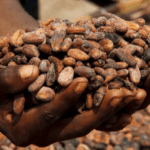
The Industrial and Commercial Workers Union (ICU) has issued a dire warning to the government, insisting that the only way to save Ghana’s cocoa sector from imminent collapse is by immediately writing off the massive debt burden of over GH¢30 billion owed by the Ghana Cocoa Board (COCOBOD).
Reacting to the government’s 2026 Budget Statement, ICU General Secretary Morgan Ayawine acknowledged the government’s renewed commitment to the sector but stressed that only a decisive financial intervention of this magnitude can restore COCOBOD to its former “glorious position” as a global leader.
The call for a full debt cancellation and recapitalization comes as Ghana’s vital cocoa industry faces deep-seated structural and financial challenges. Mr. Ayawine cautioned against singular blame, framing COCOBOD’s debt as part of a wider, global industrial phenomenon.
“Recently we have been saddled by challenges in the cocoa industry. Every sector globally is bedeviled with issues such as debts, so when we hear that COCOBOD has debts, it should not be taken as though COCOBOD alone is at fault,” he said.
“What government needs to do is to see the importance of Ghana COCOBOD and take pragmatic steps to halt its decline. These are challenges, even though management and workers are doing their best,” he told TV3.
He articulated the ICU’s core solution, emphasising the need for immediate, drastic action:
“What COCOBOD needs is capital injection to reclaim its glorious position as the leading producer of cocoa in the world. Writing off COCOBOD’s debt and recapitalizing the institution will put it on the right pedestal to boost production.”
The ICU welcomed the announcement by Finance Minister Dr. Ato Forson in the 2026 Budget that the government intends to procure over 200,000 hectares of land for cocoa expansion next year. Mr. Ayawine lauded this as a “bold decision” that could help COCOBOD meet its long-standing objective of achieving one million metric tonnes of cocoa production.
“If government is able to acquire the 200,000 hectares of land to boost production, there will be no doubt in anyone’s mind that COCOBOD is moving towards achieving its one million metric tonnes,” he added.
However, the union raised a serious, immediate concern regarding market operations: the Produce Buying Company (PBC)—a key purchaser of cocoa beans—has not received the necessary funding for the ongoing main crop season, which typically commences in October.
This lack of operational capital risks disrupting the purchasing cycle and negatively impacting farmers and market stability.
Beyond the cocoa sector, the ICU used the budget reaction to call for financial support to be extended to other distressed industries crucial for employment.
Mr. Ayawine praised the government’s decision to fully recapitalize the National Investment Bank (NIB), acknowledging the shift from earlier plans for a potential merger with the Agricultural Development Bank (ADB).
“The Minister talked about the successful recapitalization of NIB, which was expected to merge with ADB. Through discussions, government allowed both banks to operate independently, and fully recapitalizing NIB is commendable,” he said. “We need to escalate this to other banks that are in distress.”
The ICU also questioned the feasibility of the budget’s target to create 20,000 new jobs in the textiles and garments sector, arguing that the priority must be on reviving existing, distressed factories.
Mr. Ayawine cited the dramatic collapse of the industry, which has seen the number of functional companies dwindle sharply.
“The textiles and garments sector used to have about 40 companies. Today, we are talking about three or four, and even these existing factories are not functioning well.
Thousands of workers are at home,” he noted. “If government is coming with this laudable idea to set up new companies, we believe the old factories should be revived to complement the new ones,” he suggested.